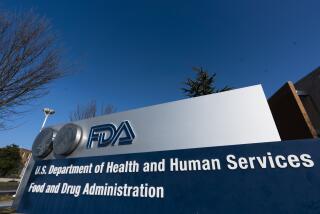As genetic testing races ahead, doctors are left behind
Genetic tests that can help predict and refine a patient’s response to drug therapy may be the first big thing in personalized medicine. But the vast majority of physicians doesn’t know how to use them, a new survey finds.
Individual genetic variations can affect how a patient will respond to many antidepressants, pain medications, cardiovascular medicines and certain drugs that treat cancers and gastrointestinal ailments. In all, roughly one in four American patients takes medications whose effectiveness could be tweaked or predicted by a pharmacogenetic test. And purveyors of genomic testing services and devices are rushing to provide tests for them all.
A survey of more than 10,000 U.S. physicians undertaken by the American Medical Assn. and the pharmacy benefits manager Medco Health Solutions Inc. found that just more than 25% had any type of education in the use of genetic testing to guide medication decisions. And only 1 in 10 felt he or she had the necessary training and knowledge to put pharmacogenetic testing to good use in treating patients. Some 13% had ordered or recommended a genetic test for a patient in the last six months. But twice that many said they would do so in the next six months.
Genes that regulate liver enzymes can have a particularly powerful influence on a patient’s response to a medication. Scientists believe that one such enzyme may be responsible for governing the way patients respond to some 30% of all drugs used today.
A test can help predict if breast cancer patients will respond to the drug tamoxifen. And cancer drugs in the development pipeline are expected overwhelmingly to be administered with the guidance of genetic tests.
Genetic tests also can help reduce unwanted side effects. The blood thinner warfarin, for instance, can cause blood clots or serious bleeds in some patients with an identified genetic variance, and physicians are increasingly testing those on a blood-thinning regimen in an effort to reduce such risks.
“It’s clear there’s wide acceptance” on physicians’ part for the role that genetic testing can play in guiding medication decisions, said Dr. Robert Epstein, Medco’s chief medical officer, who briefed physicians and researchers on the survey at the annual meeting of the American Society of Human Genetics on Thursday.
But the AMA and other groups must step up efforts to educate physicians in the use of these tests, he added. “With the number of new drugs coming to market with a companion diagnostic, it’s paramount that this education takes place.”
--







